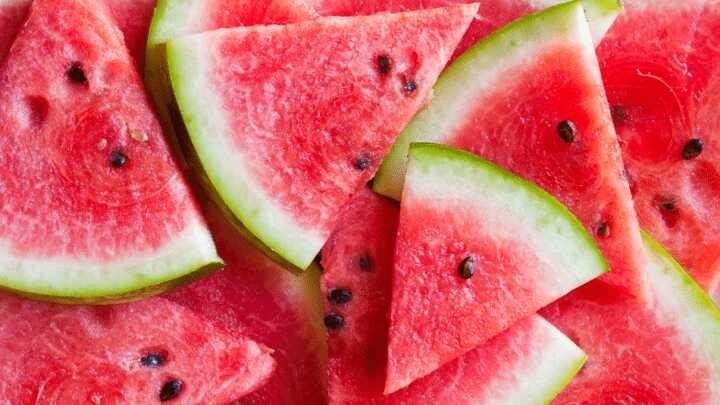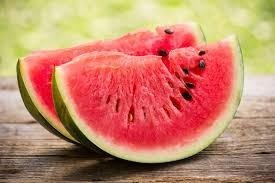The fruit of the watermelon plant, having a green rind and watery flesh that is typically bright red when ripe and contains black pips, it contain about 92% of water and soaked with many nutrients.
It contains only 46 calories per cup, but is high in vitamin A, vitamin C, vitamin B6 and many healthy plant compounds,lots of lycopene, antioxidants, amino acids and modest amount of potassium.
Fiber and water are important for healthy digestion,Watermelon contains both.
"Foods that are high in antioxidants and amino acids allow your body to function optimally," said Angela Lemond, a Plano, Texas-based registered dietitian nutritionist and spokesperson for the Academy of Nutrition and Dietetics

Nutrition facts
Here are the nutrition facts for the watermelon, according to the U.S. Food and Drug Administration, which regulates food labeling through the National Labeling and Education Act:
Serving size: 2 cups diced (10 oz / 280 g)
Calories: 80 (Calories from Fat 0)
Amount per serving (and %DV*)
*Percent Daily Values (%DV) are based on a 2,000 calorie diet.
Total Fat: 0g (0%)
Total Carbohydrate: 21g (7%)
Dietary Fiber: 1g (4%)
Sugars: 20g
Cholesterol: 0mg (0%)
Sodium: 0mg (0%)
Potassium: 270mg (8%)
Protein: 1g
Vitamin A: (30%)
Vitamin C: (25%)
Calcium: (2%)
Iron: (4%)

Health benefits
It may prevent cancer
like other fruits and vegetables, watermelons may be useful and helpful in reduce high risk of cancer, Researchers have studied lycopene and other individual plant compounds in watermelon for their anticancer effects. Also Lycopene appears to reduce cancer risk by lowering insulin-like growth factor (IGF), a protein involved in cell division. High IGF levels are linked to cancer.
It may reduce heart disease
It is obvious that that heart disease is the number one causes of death worldwide,
Lifestyle factors, including diet, may lower the risk of heart attacks and strokes by reducing blood pressure and cholesterol levels.
It lowering the blood pressure
Watermelon also contains citrulline, an amino acid that may increase nitric oxide levels in the body. Nitric oxide helps your blood vessels expand, which lowers blood pressure.
Is good for skin and hair
Two vitamin in watermelon I. e vitamin A and C are essential for skin and hair health
Vitamin C helps your body make collagen, a protein that keeps your skin supple and your hair strong.
Vitamin A is also important for healthy skin since it helps create and repair skin cells. Without enough vitamin A, your skin can look dry and flaky.
Both lycopene and beta-carotene may also help protect your skin from sunburn.
Can Help Improve Digestion
Eating water-rich and fiber-rich fruits and vegetables, including watermelon, can be very helpful for promoting normal bowel movements
Take home message
Watermelon contains lots of water and a small amount of fiber — both of which are important for healthy digestion...
To be continued......

Watermelons are amazing for your body and they taste delicious! I wish they didn't have seeds though.
I will include the benefits of watermelon seed In Part 2